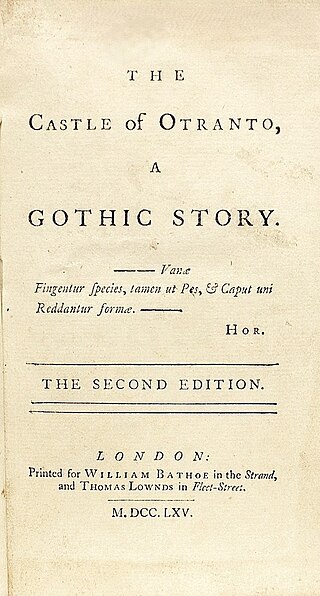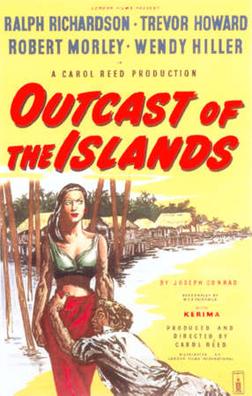
Heart of Darkness is an 1899 novella by Polish-British novelist Joseph Conrad in which the sailor Charles Marlow tells his listeners the story of his assignment as steamer captain for a Belgian company in the African interior. The novel is widely regarded as a critique of European colonial rule in Africa, whilst also examining the themes of power dynamics and morality. Although Conrad does not name the river on which most of the narrative takes place, at the time of writing, the Congo Free State—the location of the large and economically important Congo River—was a private colony of Belgium's King Leopold II. Marlow is given a text by Kurtz, an ivory trader working on a trading station far up the river, who has "gone native" and is the object of Marlow's expedition.

Joseph Conrad was a Polish-British novelist and story writer. He is regarded as one of the greatest writers in the English language and although he did not speak English fluently until his twenties, he became a master prose stylist who brought a non-English sensibility into English literature. He wrote novels and stories, many in nautical settings that depict crises of human individuality in the midst of what he saw as an indifferent, inscrutable and amoral world.

Ishmael is a character in Herman Melville's Moby-Dick (1851), which opens with the line "Call me Ishmael." He is the first-person narrator of much of the book. Because Ishmael plays a minor role in the plot, early critics of Moby-Dick assumed that Captain Ahab was the protagonist. Many either confused Ishmael with Melville or overlooked the role he played. Later critics distinguished Ishmael from Melville, and some saw his mystic and speculative consciousness as the novel's central force rather than Captain Ahab's monomaniacal force of will.

The Byronic hero is a variant of the Romantic hero as a type of character, named after the English Romantic poet Lord Byron. Historian and critic Lord Macaulay described the character as "a man proud, moody, cynical, with defiance on his brow, and misery in his heart, a scorner of his kind, implacable in revenge, yet capable of deep and strong affection".

The Castle of Otranto is a novel by Horace Walpole. First published in 1764, it is generally regarded as the first gothic novel. In the second edition, Walpole applied the word 'Gothic' to the novel in the subtitle – A Gothic Story. Set in a haunted castle, the novel merged medievalism and terror in a style that has endured ever since. The aesthetic of the book has shaped modern-day gothic books, films, art, music, and the goth subculture.

Lord Jim is a novel by Joseph Conrad originally published as a serial in Blackwood's Magazine from October 1899 to November 1900. An early and primary event in the story is the abandonment of a passenger ship in distress by its crew, including a young British seaman named Jim. He is publicly censured for this action and the novel follows his later attempts at coming to terms with himself and his past and seeking redemption and acceptance.

Rachel Caine was the pen name of Roxanne Longstreet Conrad, who was an American writer of science fiction, fantasy, mystery, suspense, and horror novels.

Erma is a fantasy-dark comedy slice of life webtoon created by Mexican artist Brandon J. Santiago. It follows the adventures and misadventures of the titular eight-year-old Erma Williams' experiences as a half-human, half-yōkai/ghost, tending to use her haunting abilities for everyday antics, whether for better or for worse, focusing on themes such as friendship and acceptance. Santiago initially published the webcomic on DeviantArt and Tumblr in May 2014, but has since released it on various services from January 2016, such as Tapas and WEBTOON. It is available in two languages, English and Spanish. In January 2020, Comics Beat reported that with 64.5 million views and 74.9 thousand subscribers, Erma was the most-viewed webcomic on the Tapas syndicate in 2019.
Outcast or Outcasts may refer to:
Almayer's Folly is Joseph Conrad's first novel, published in 1895 by T. Fisher Unwin. Set in the late 19th century, it centres on the life of the Dutch trader Kaspar Almayer in the Borneo jungle and his relationship to his mixed heritage daughter Nina.
The works of Joseph Conrad encompass novels, short stories, nonfiction, and memoirs. Although he was born in Ukraine and spoke Polish and French fluently from childhood, he wrote in English, which he did not learn until his twenties. Philosopher Wincenty Lutosławski recalled Conrad explaining this, saying "I value our beautiful Polish literature too much to bring into it my clumsy efforts. But for the English my gifts are sufficient and secure my daily bread."

Victory is a psychological novel by Joseph Conrad first published in 1915, through which Conrad achieved "popular success."

The Rescue, A Romance of the Shallows (1920) is one of Joseph Conrad's works contained in what is now sometimes called the Lingard Trilogy, a group of novels based on Conrad's experience as mate on the steamer Vidar. Although it was the last of the three novels to be published, after Almayer's Folly (1895) and An Outcast of the Islands (1896), the events related in the novel precede those. The story follows Captain Tom Lingard, the recurring protagonist of The Lingard Trilogy, who was on his way to help a native friend regain his land when he falls in love with a married woman whose yacht he saves from foundering.

Outcast of the Islands is a 1951 British adventure drama film directed by Carol Reed based on Joseph Conrad's 1896 novel An Outcast of the Islands. The film features Trevor Howard, Ralph Richardson, Robert Morley and Wendy Hiller.

The Rescue is a 1929 American sound pre-Code romantic adventure film directed by Herbert Brenon, and produced by Samuel Goldwyn. While the film has no audible dialog, it was released with a synchronized musical score with sound effects using both the sound-on-disc and sound-on-film process. The screenplay was written by Elizabeth Meehan, based on the 1920 novel by Joseph Conrad. The music score is by Hugo Riesenfeld. The film stars Ronald Colman and Lili Damita.
Giorgio Moser was an Italian film director and screenwriter. He directed seven films between 1954 and 1996.
Outcast Islands may refer to:

Victory is a 1996 French-German drama suspense film written and directed by Mark Peploe and starring Willem Dafoe, Irène Jacob, Sam Neill and Rufus Sewell. It is based on the 1915 novel of the same name by Joseph Conrad.

Joseph Conrad was a Polish author who wrote in English after settling in England. He is regarded as one of the greatest writers in English, though he did not speak the language fluently until he was in his twenties, and always with a marked Polish accent. Before embarking on writing, he had a career sailing in the French, then the British, merchant marine. Of his 19-year merchant-marine career, about half that time was spent actually at sea.

Nautical fiction, frequently also naval fiction, sea fiction, naval adventure fiction or maritime fiction, is a genre of literature with a setting on or near the sea, that focuses on the human relationship to the sea and sea voyages and highlights nautical culture in these environments. The settings of nautical fiction vary greatly, including merchant ships, liners, naval ships, fishing vessels, life boats, etc., along with sea ports and fishing villages. When describing nautical fiction, scholars most frequently refer to novels, novellas, and short stories, sometimes under the name of sea novels or sea stories. These works are sometimes adapted for the theatre, film and television.















